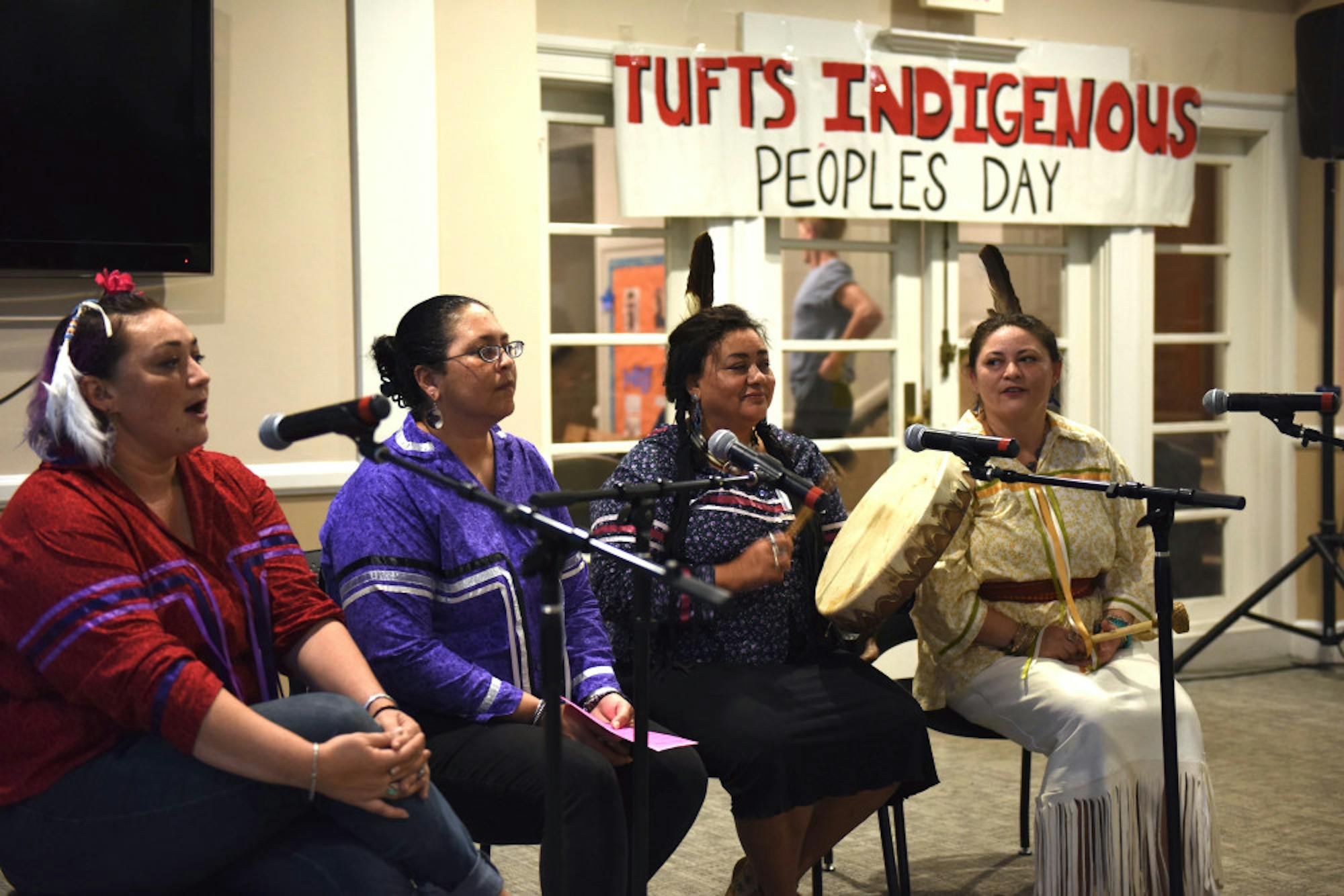Content warning: This article mentions sexual and domestic violence.
Tufts observed Indigenous People’s Day on Monday with a celebration that included music, dancing, food and vendors. The festivities took place in the Carmichael Hall lounge from 4 to 7 p.m.
The annual celebration began last year after faculty voted to replace Columbus Day with Indigenous People's Day in the academic calendars in February 2016. Tufts is the first major university in the Northeast to do so, according to event organizer Anna Del Castillo. Del Castillo, a senior, also presented the rationale behind the change as a member of Tufts Community Union (TCU) Senate to faculty prior to their vote.
“Even though it’s a name change, it’s more than just a symbol," she said. Del Castillo said organizers of Indigenous People's Day at Tufts already are working to add an indigenous studies minor and hope to achieve greater representation of indigenous people in the student body and faculty, as well as having more programming for indigenous students.
Other event organizers included junior Parker Breza, senior Ana Manriquez, senior Benya Kraus and senior Farley Flores. Del Castillo and Breza estimate that this year’s event achieved equal or increased attendance compared to the Indigenous People’s Day Celebration in 2016, as well as including an additional hour of performances and speeches.
In addition to the main performances, the event also featured local indigenous vendors selling art and jewelry.
Elizabeth Solomon, assistant director of academic affairs and fellowship programs at the Harvard T.H. Chan School of Public Health and a member of the Massachusetts tribe at Ponkapoag, opened the event with a speech commending the strength of indigenous people in the Americas.
“I honor their fortitude, their resilience and their dedication to their people and culture," Solomon said. "Because despite all the efforts to take them away, we still have our native identity. We honor our ancestors and our cultures. We speak our truths. We are still here and we will remain."
Following Solomon, the La Piñata performance group performed a traditional Mayan ceremony incorporating song, dance and instruments. The group’s director, Rosalba Solis, referenced the four squares of brightly colored cloth in the middle of the room, remarking on their parallel to the four cardinal directions. The ceremony also included a singing portion during which attendees were encouraged to learn the traditional song being performed.
Solis also emphasized the importance of protecting the environment, tying recent natural disasters to the poor treatment of Earth and detailing the actions that both individuals and Tufts as a university can take to improve the environment.
“We’re just misusing everything that Mother Earth has given us," Solis said. "So it’s time for us to be aware. Today, while you are celebrating, try to think about that, deep in you. If there is one thing I can change, what would it be?”
Next, Mahtowin Munro, a co-leader of the United American Indians of New England, spoke about the importance of observing Indigenous People’s Day, a day that focuses on appreciating the culture and recognizing the oppression of indigenous people.
“It’s not enough to just get rid of Columbus Day,” Munro stated. “So much harm, so much damage, has been done to us as a result of celebrating our genocide for generation after generation in this country that what we need is a day that’s a real holiday… That's going to turn the tables on Columbus Day."
Munro’s speech concluded with dinner, which included traditional indigenous foods. During the meal, musician and artist Geri Barney entertained visitors with both original songs and traditional music on the flute and guitar.
American studies lecturer Jami Powell spoke about the shift in recognition of indigenous people at Tufts, applauding students for changing Columbus Day to Indigenous People’s Day and encouraging them to continue pursuing social change on campus.
Sonya Isaac, the director of the Circles of Support Women’s Program for the North American Indian Center of Boston, next spoke on the injustices faced by indigenous women, who she said are 10 times more likely to be victims of sexual or domestic violence than non-Native women. She expressed hope over recent actions to recognize and promote fair treatment of indigenous people, as well as the community evident in movements like the protests in Standing Rock.
“We have survived everything that was developed to break us, and we have stayed resilient,” she said. “We are native.”
Next, the Nettukkuskq Singers, nettukkuskq meaning sisters, took the stage to perform a combination of both original and traditional songs, focusing mostly on friendship and love. These four women echoed Isaac’s words, singing, “For we are Nettukkuskq, native and strong.”
The final performance of the night came from the Eastern Sun Drummers, a group of drummers, singers and dancers. Each of the dancers demonstrated a different cultural dance, relating to courtship, healing or war.
The Eastern Sun Drummers invited attendees to join hands for a round dance, symbolizing friendship and camaraderie between all people.
“It’s about recognizing history and how history is taught, and celebrating the resilience of Native peoples everywhere, as well as reminding people that Native people aren’t gone," Del Castillo said. "We’re still here, we’re very much present."
Tufts hosts second annual Indigenous People’s Day celebration

A group of music lovers perform Native American songs in traditional attire and instrument during the Tufts Indigenous People's Day Celebration in Carmichael Hall on Oct. 9.





